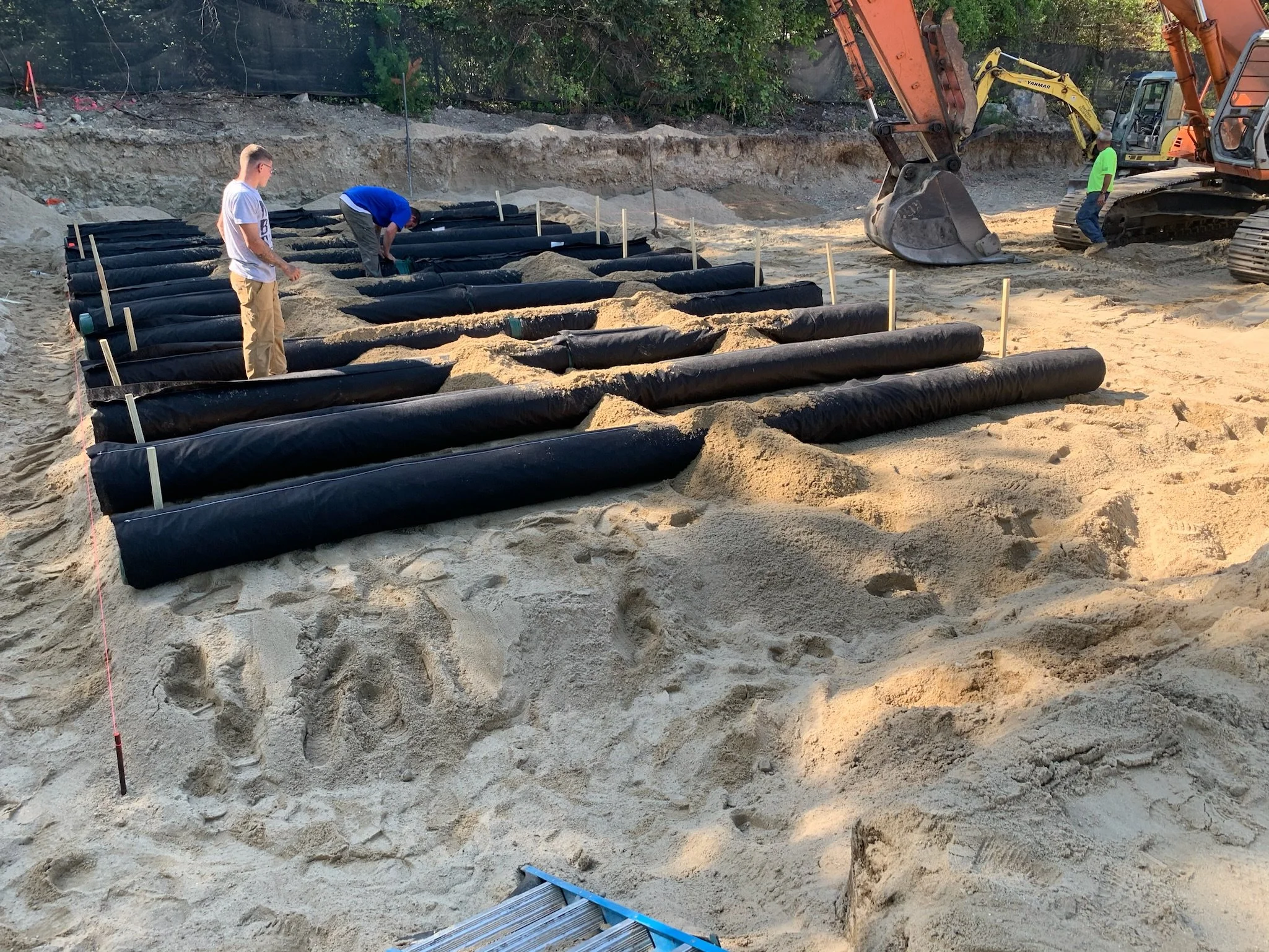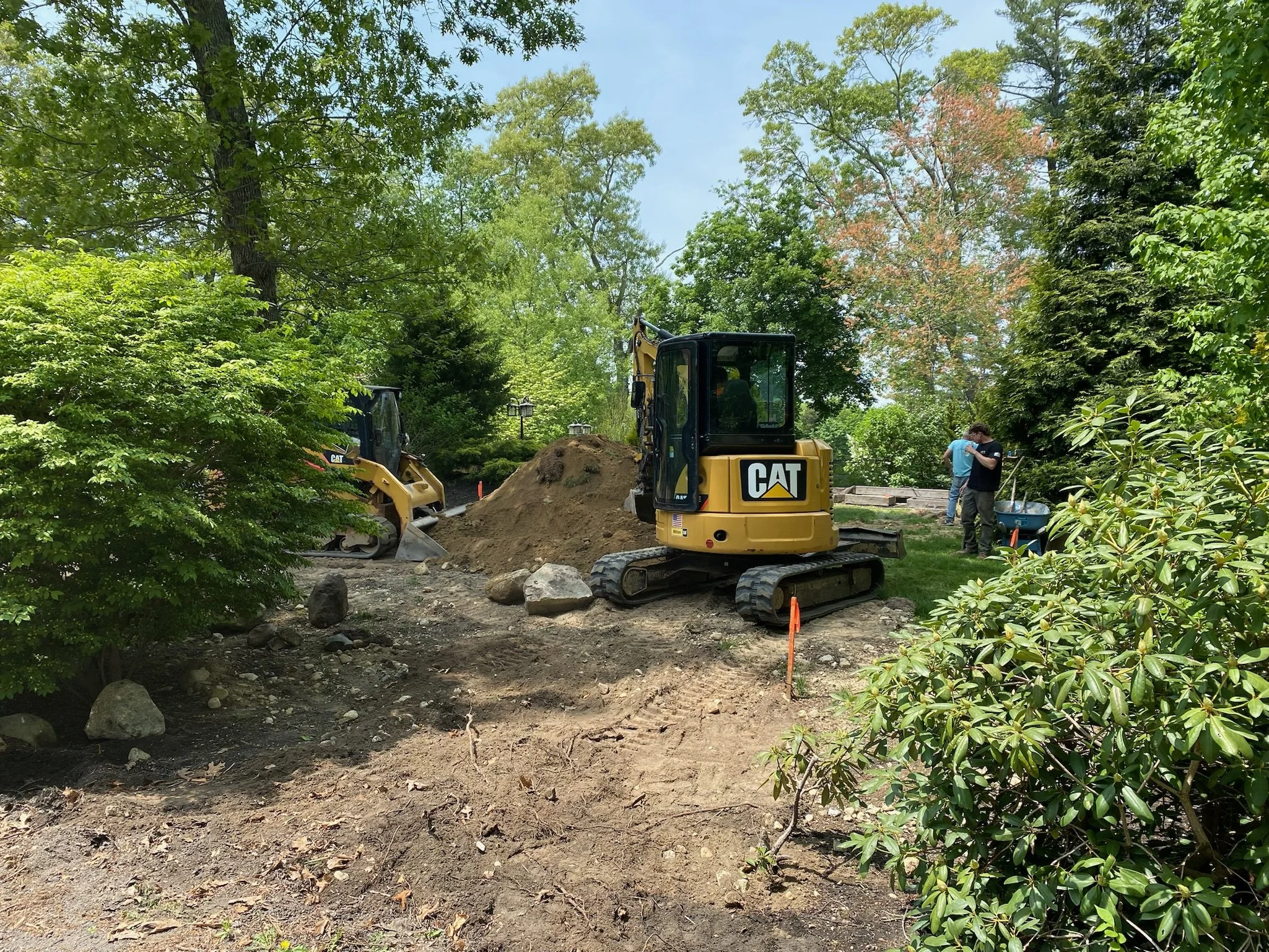
Failed Your Title V ? We Fix It Fast.Septic Solutions for South Shore & Cape Cod Properties
From perc tests to getting engineered plans, to excavation of your old system & Certificate of Compliance of your New system
Amex Construction handles the entire process
We work directly with local soil evaluators, septic designers, and your town’s Board of Health to keep you compliant and on schedule. Our Team stays up to date with Title V, Innovative/Alternative (I/A) Septic Systems & Local Regulations
Don’t Let a Failed Title V Inspection Derail Your Sale or Your Home
When your septic system fails, the clock starts ticking. Whether you’re selling a home, buying one, or simply staying compliant, you need a contractor who knows the rules, the soil, and the local boards of health. That’s where Amex Construction comes in.
We’ve been installing and repairing septic systems across Hanover, The South Shore, and Cape Cod. From sandy Cape lots to tight South Shore backyards, we’ve seen it all—and we know how to keep your project on schedule.
Why Builders, Homeowners, Realtors & Developers Choose Amex Construction
Certified for Innovative/Alternative (I/A) Septic Systems: Our Team is Trained in I/A systems & stays up to date on industry advances
Start-to-Finish Collaboration: From the very first soil evaluation and perc test, we work directly with licensed soil evaluators, septic designers, and local boards of health to make sure your system is designed, permitted, and installed the right way.
By-the-Book Precision: Every installation follows the engineered plan exactly—no shortcuts, no guesswork. Compliance is guaranteed.
Local Expertise: We’ve built systems across Massachusetts. We know each town’s requirements and quirks, which means fewer delays and no surprises.
One-Stop Service: We partner with trusted plumbers and electricians so that we can take care of the entire process—including any necessary work inside your home or business. One call, one team, complete peace of mind.
Septic to Sewer Conversions: From Title V abandonment to Connecting to the Municipal sewer & Specialty pumps like Enviromental One - All terrain sewer
Full Service, Start to Finish: Testing, design coordination, excavation, installation, inspections—we handle it all so you can focus on selling, buying, or just living in your home without stress.
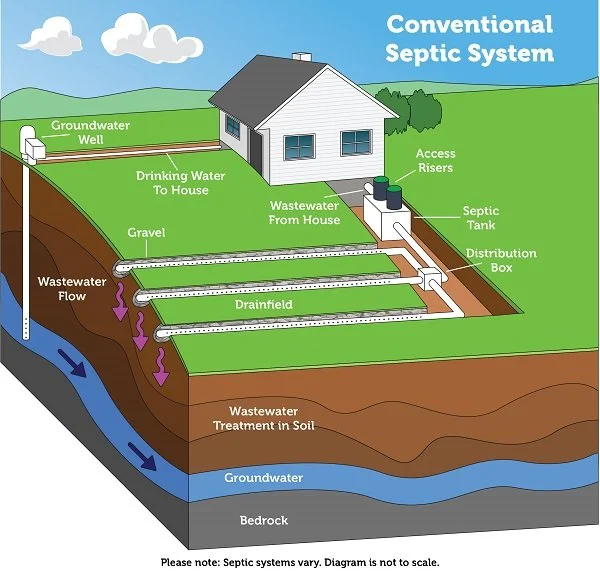
Common Septic Components
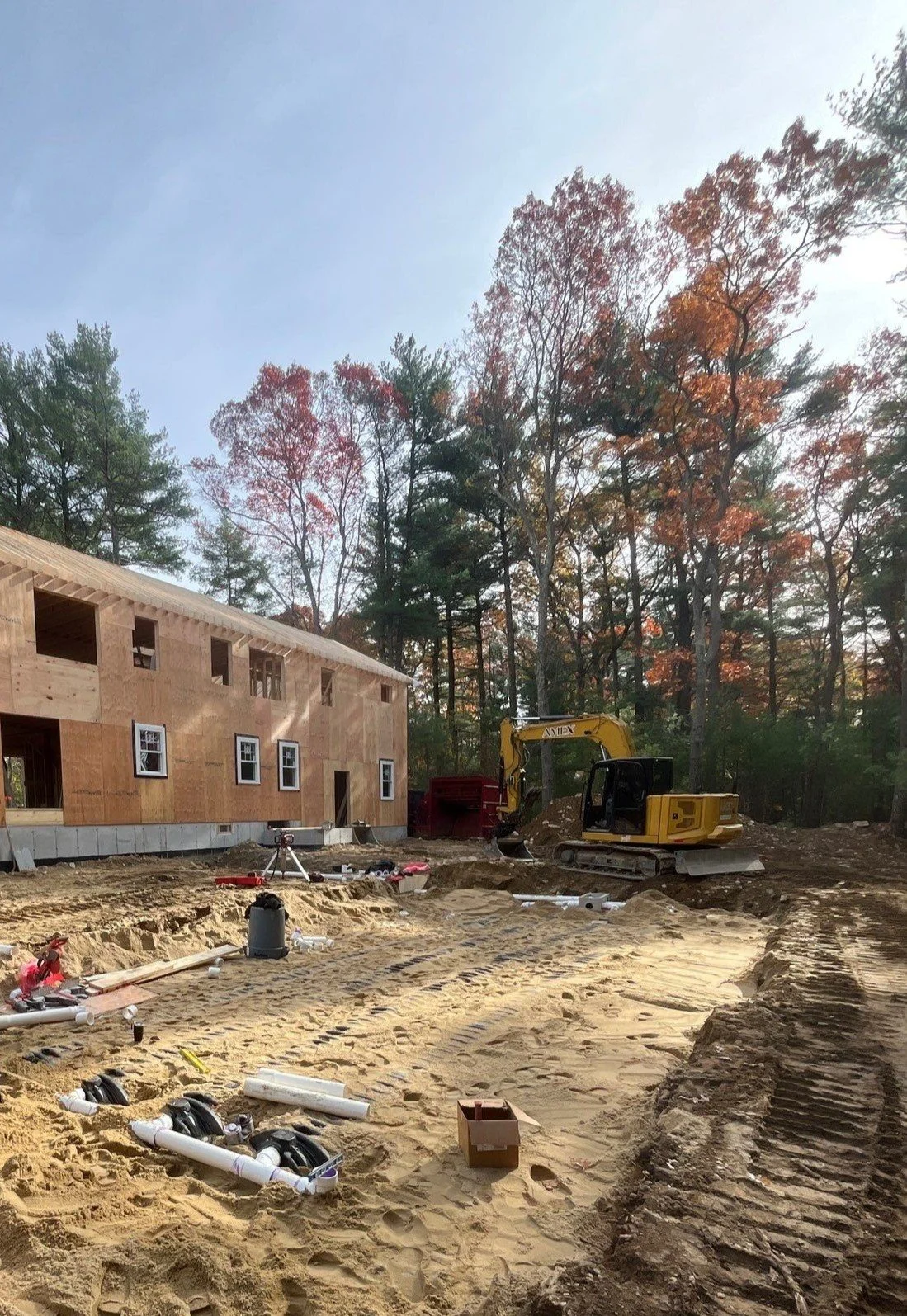
What is Title V?
If you own a home in Massachusetts with a septic system, you’ve probably heard the term Title V. It refers to the state’s set of regulations that govern how septic systems are designed, installed, and maintained. The goal is simple: protect public health and the environment by making sure wastewater is properly treated before it reaches the ground and water supply.
Title V inspections are required when:
Every 2 years or 3 years with annual pumping
You sell your home
You build an addition or make significant renovations
A system has failed or is suspected of failing
Having a passing Title V inspection is often necessary to finalize a home sale. That’s why it’s one of the most important parts of homeownership in Massachusetts if you’re on a septic system.
What Homeowners Need to Know
A septic system isn’t complicated, but it does require care. A properly maintained system can last decades, while a neglected one can fail early and cost tens of thousands of dollars to replace. Title V isn’t just a regulation—it’s also a guide for how to keep your system working for you.
Key points:
Regular pumping: Every 1–3 years is standard; Some System permits have specific pumping schedules.
Inspections: Stay ahead of problems with regular system checks, not just when you sell your home.
Water use: Septic systems can only handle so much at once. Spread out laundry loads and fix leaky toilets or faucets to avoid overloading.
What goes down the drain matters: Avoid FOG or Fats Oils & Grease. Also avoid flushing non septic safe toilet paper, wipes, or harsh chemicals. They can clog or kill the bacteria your system needs to function.
Protect your drain field: Don’t Park vehicles, build decks, or plant trees with invasive roots over your leaching area.
Septic System Don’ts
Your septic system is tough but not indestructible. The fastest way to shorten its life (and your wallet) is by treating it like a garbage can or a parking lot. Here’s what not to do:
Don’t flush non-biodegradable items: Wipes (even “flushable”), paper towels, feminine products, diapers, and dental floss all clog and damage the system.
Don’t pour grease, fats, or oils down the drain: They harden in pipes and overwhelm the tank.
Don’t use harsh chemicals: Bleach, drain cleaners, and antibacterial products kill the beneficial bacteria your septic system needs to work.
Don’t overload with water: Avoid running multiple long showers and laundry loads back-to-back. Sudden surges can push solids into the drain field.
Don’t drive or park on the leach field: Vehicle weight compacts the soil and crushes pipes.
Don’t plant trees or shrubs with aggressive roots nearby: Roots invade and block leach lines. Stick to grass.
Don’t ignore warning signs: Slow drains, sewage odors, or standing water near your system are all red flags—get them checked fast.
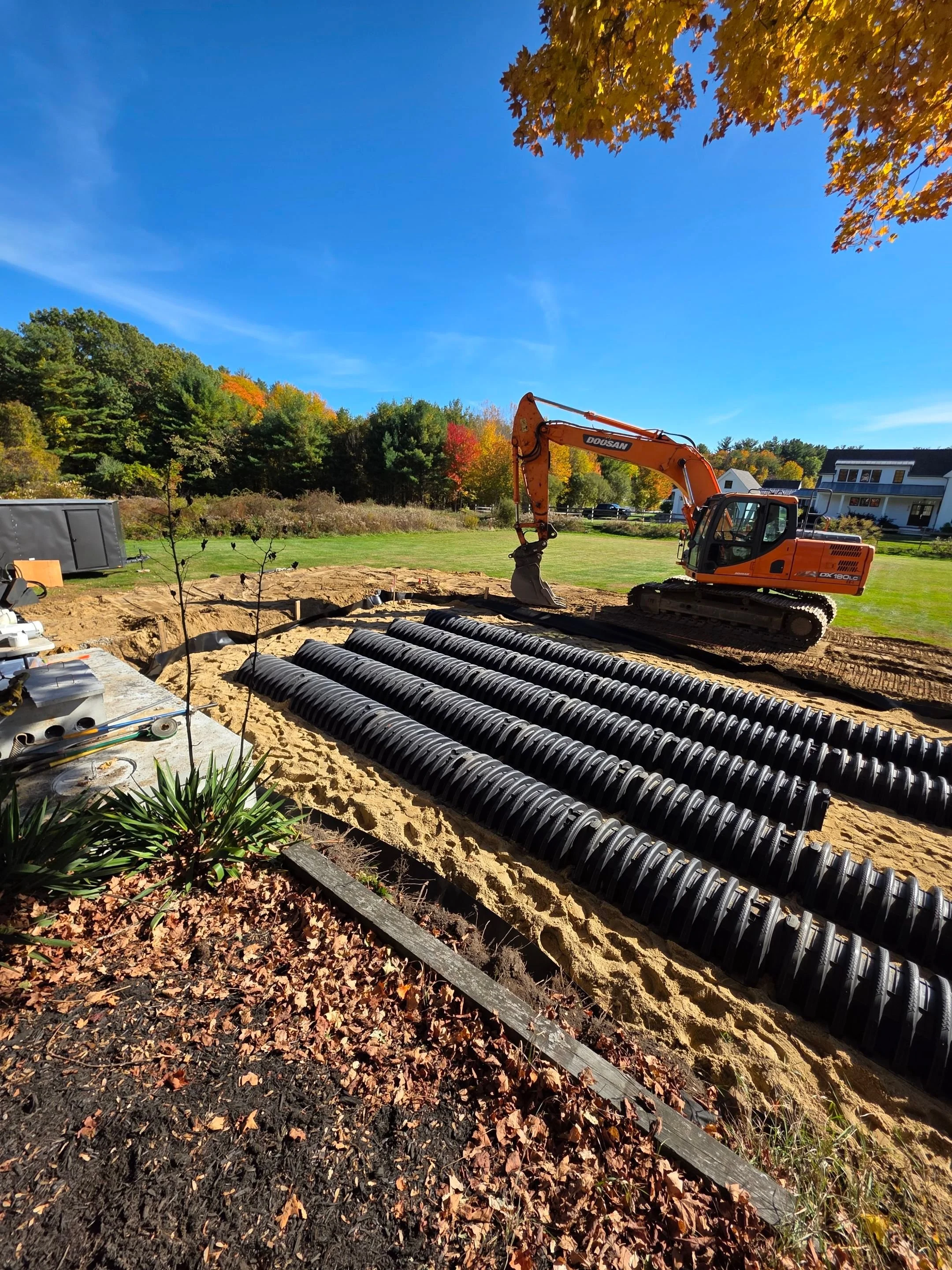
Innovative/Alternative (I/A) Septic Systems
Common Types of I/A Systems
Bottomless Sand Filters
Recirculating Sand Filters
Textile filters
Orenco Advantex Wastewater Treatment systems
Presby Environmental Advanced Enviro-Septic®
Aerobic treatment units (ATUs)
Nitrogen-reducing bioreactors
I/A System Services We Provide
Site evaluation and system design
Permitting and coordination with local Boards of Health
Installation and construction
Ongoing operation & maintenance agreements
Monitoring and reporting (as required by Title V)
What Are I/A Systems?
Innovative/Alternative (I/A) systems are advanced septic technologies designed to treat wastewater more effectively than traditional systems. They are often required in environmentally sensitive areas or when standard Title V systems aren’t feasible due to soil conditions, high groundwater, or small lot sizes.
Why Choose an I/A System?
Environmental protection: Better nitrogen and phosphorus removal to protect water resources.
Flexibility: Can be designed to fit challenging sites where traditional leach fields won’t work.
Regulatory compliance: Approved by the Massachusetts Department of Environmental Protection (MassDEP) for use under Title V.
Long-term value: Reduces the risk of system failure and costly environmental impacts.
Why Amex Construction?
At Amex Construction, we bring decades of Title V and septic system expertise to projects that demand advanced solutions. Whether your property requires an I/A system to meet local regulations or you’re proactively investing in environmental stewardship, our team has the experience to get it done right.
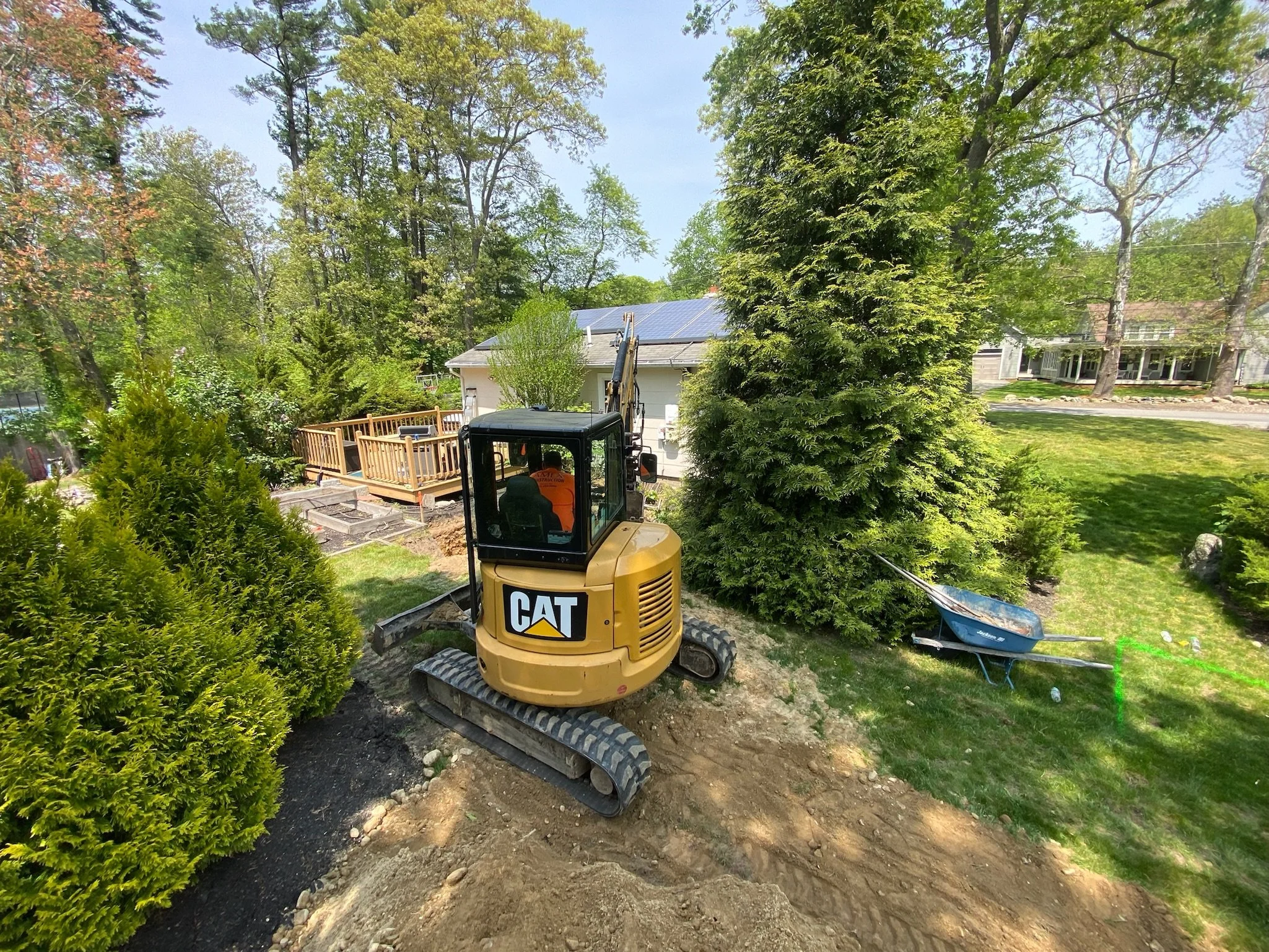
Septic to Sewer Conversions Made Simple
Switching from a septic system to a town sewer connection can feel overwhelming. Homeowners often worry about what it means for their property, how long it will take, and what it might cost. At Amex Construction, we specialize in making this transition smooth, stress-free, and built to last.
Our team works directly with local towns and utility departments, handling permits, approvals, and inspections so you don’t have to juggle the paperwork. We take care of every step—from disconnecting your old system to connecting your home to the municipal sewer line—while keeping your yard and property protected as much as possible.
For many homeowners, this upgrade brings long-term peace of mind. No more septic pumping schedules, no surprise system failures, and no uncertainty when it comes time to sell your home. Connecting to the sewer means reliability, lower maintenance, and higher property value.
If you’re facing a failing septic system or just want to explore your options, we’re here to guide you through it with honesty, clarity, and dependable workmanship. We’ve helped local families make the switch—and we’ll be right there with you too.



